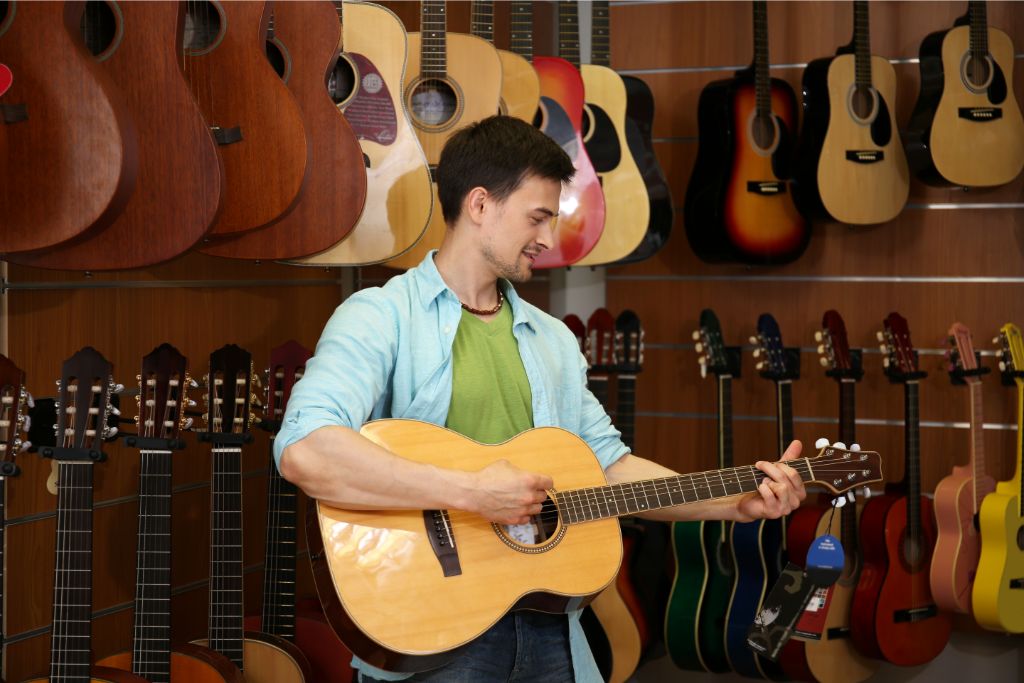You’re the boss of an indie music store, aren’t you? You’ve got a fiery passion and a record collection to kill for. But let’s be honest. You don’t fully tap social media’s power. Fear not! We’ve got your back.
This guide is your key to mastering social media. We’ll help you decipher your audience and connect with them effectively. Let’s turn those digital thumbs-ups into real-world sales.
Table of Contents
- 1 Understanding Your Audience
- 2 Choosing the Right Social Media Platforms
- 3 Creating Engaging Content
- 4 Utilizing Hashtags and Keywords
- 5 Engaging with Your Community
- 6 Running Social Media Campaigns
- 7 Measuring Your Success
- 8 Staying Up-to-Date with Social Media Trends
- 9 BONUS
- 10 Frequently Asked Questions
- 10.1 How can I legally use copyrighted music in my social media posts?
- 10.2 What is the best way to handle negative comments or reviews on social media?
- 10.3 Are specific times of day most effective for posting on social media?
- 10.4 How can I collaborate with other local businesses or artists on social media to boost my store’s visibility?
- 10.5 How do I set up and optimize my store’s profile on various social media platforms?
Understanding Your Audience

You’ve got to understand who your audience is if you’re going to make social media work for your independent music store. This isn’t just about knowing their age or location. It’s about delving into the nitty-gritty of audience demographics. What are their interests? What genres do they listen to most? When are they most active online?
This knowledge allows you to craft targeted advertising that resonates with your followers. For instance, if a significant chunk of your audience leans towards rock music and stays online late at night, a midnight release of an exclusive rock vinyl might hit the sweet spot.
Don’t forget platforms like Facebook and Instagram offer in-depth analytics tools that can provide valuable insights into your audience’s behavior and preferences. Use these tools to refine your approach continuously.
Moreover, understanding your audience goes beyond metrics; it also means being in tune with current music industry trends. Is vinyl making a comeback? Are cassettes still cool? Knowing what’s hot and not will help drive engagement on your social media platforms.
Choosing the Right Social Media Platforms
It’s crucial to pick the right online platforms to promote your unique inventory and engage with potential customers. Not every platform suits every business. You’ve got to understand platform demographics, identify where your target audience hangs out, and implement your social media advertising strategies there.
For instance, if you’re selling vintage vinyl records, Instagram and Pinterest might be your go-to platforms due to their visual nature and user base who appreciate nostalgia. But if you’re promoting emerging indie artists’ CDs or digital downloads, Twitter or TikTok would benefit more because of their real-time updates and young demographic.
In terms of content creation, vary it up! Merely posting pictures of products won’t cut it; you need engaging content. Share behind-the-scenes footage of unpacking new arrivals or post short clips of an album playing on a turntable. Create contests that encourage users to share posts about their favorite purchases from your store.
Remember: Social media isn’t just for selling—it’s for building relationships, too. Engage in conversations with followers—answer questions, ask for opinions on new releases, and create playlists based on popular votes!
Creating Engaging Content

Creating engaging content isn’t just about showcasing products; it’s also about storytelling and connecting with your audience personally. Visual storytelling is key here. Think of your social media platforms as stages where you perform narratives that captivate audiences.
You must be mindful of what’s trending in the music industry and incorporate that into your content calendar. This will make your store appear current and relevant. To create vivid imagery for your followers, consider the following:
- Hosting live sessions with local bands
- Showcasing vintage records or unique instruments
- Sharing behind-the-scenes looks at how you curate music selections
- Posting user-generated content such as customers’ reviews or their curated playlists
Your engagement techniques should encourage interaction between you and your followers. Ask them about their favorite albums, invite them to share photos of their record collections, and conduct polls asking them to choose between iconic band tees – the endless possibilities!
Utilizing Hashtags and Keywords

We’re now moving on to utilizing hashtags and keywords, which can be vital tools in expanding your online reach.
The music industry is constantly evolving, and so should your social media strategies. Hashtags aren’t just trendy additions to a post; they’re searchable links connecting you with potential customers with common interests.
With hashtag analytics, you can monitor their performance and discover which resonates with your audience. It’s essential to use popular music-related hashtags and those specific to your niche market within the industry.
In addition to effective hashtag use, keyword optimization is crucial in driving traffic to your content. When developing posts or blog content for your website, consider what words or phrases someone interested in your product might search for online. Incorporate these into your content naturally; remember, it’s not about stuffing as many keywords as possible but finding a balance between readability and SEO strategy.
Keep an eye on current trends and adapt accordingly—this includes trending topics within music culture and shifts in platform algorithms. Stay adaptable, stay informed, and most importantly—stay authentic to the voice of your independent music store!
Engaging with Your Community

Engaging with your local community shouldn’t be overlooked, as it’s a powerful way to build loyal customers and spread the word about new arrivals or promotions. Building a solid rapport with your audience through community collaborations can boost your store’s visibility and reputation in the music industry.
Here are four ways you can leverage social media to achieve this:
- Host in-store events – Live performances by local bands or album release parties attract foot traffic and create shareable content for social media.
- Collaborate with other businesses – Partnering for joint promotions or contests helps tap into their customer base while providing mutual benefits.
- Support local causes – Sponsor a charity event or donate to a school’s music program; it shows you’re invested in the community’s well-being.
- Promote customer interactions – Encourage customers to share their music finds from your store on social media, creating an organic promotion.
Running Social Media Campaigns
Effective online campaigns can drastically enhance your store’s visibility and customer engagement. Campaign budgeting is key, ensuring you’re investing wisely in reaching potential customers. You’ll want to take advantage of current music industry trends, tailoring your content to what’s hot and trending.
Influencer partnerships are another powerful strategy. You can reach an even broader audience by partnering with influencers who align with your brand. However, don’t just choose any influencer; ensure their style and audience match yours.
To keep track of these strategies:
| Strategy | Implementation |
|---|---|
| Campaign Budgeting | Allocate funds appropriately across platforms |
| Music Industry Trends | Keep up-to-date and tailor posts accordingly |
| Influencer Partnerships | Collaborate for a wider reach |
| Content Creation | Stay creative and engaging |
Remember that social media is a conversation – stay responsive and engage with followers regularly. Be sure to monitor the impact of your campaigns, too, adjusting as necessary based on performance metrics.
Measuring Your Success

It’s crucial to measure the success of your online campaigns to understand their effectiveness and make any necessary adjustments. With social media being a significant platform for independent music stores, adopting Success Analytics can help you gauge whether your strategies resonate with your audience or if it’s time to switch things up.
To get started with evaluating your campaigns, consider incorporating these key metrics:
- Engagement Rate: This is the percentage of users who interacted with your post compared to those who saw it.
- Conversion Rates: Always monitor how well your posts drive sales or other desired actions.
- Audience Growth Rate: Keep track of how quickly you’re gaining followers, as this can give insights into the reach and appeal of your content.
Being in tune with these numbers gives you a sense of the rhythm of your campaign and provides valuable feedback that enables you to fine-tune future strategies.
Staying Up-to-Date with Social Media Trends
Staying ahead with current trends can significantly boost your online presence and customer engagement. As an independent music store owner, you’ve got to keep your finger on the pulse of what’s making waves in the industry. This isn’t just about the latest music releases—it’s also about understanding how social media is evolving.
Trend analysis plays a crucial part here. By monitoring what’s trending across different platforms, you’ll gain insights into how audiences interact with content and respond positively. For instance, TikTok has emerged as a game-changer for music marketing, with artists going viral through catchy snippets or dance challenges related to their tracks.
Another dynamic trend is influencer collaborations. Partnering with influencers who resonate with your brand can amplify your reach exponentially. It’s not just about numbers; it’s about engaging an audience with similar interests and values.
Remember, though—while staying on top of trends is essential, authenticity shouldn’t be compromised. Your brand’s voice should always shine through in all interactions because, in the end, this uniqueness makes you stand out amongst the crowd.
BONUS
Maximize the potential of your independent music store’s social media presence with OnlySocial’s essential Post Planning and Scheduling function. Seamlessly plan and schedule your posts across all social networks, ensuring consistent and strategic content delivery. With unlimited posting and the ability to manage unlimited social profiles, you can expand your online presence without limitations. Don’t miss out on optimizing your social media strategy. Sign up for a commitment-free 7-day trial today.
Frequently Asked Questions
How can I legally use copyrighted music in my social media posts?
To legally use copyrighted music, you’ve got to master the art of obtaining licenses. Don’t be fooled – ‘fair use policy’ isn’t a magic wand. Keep an eye on evolving music industry rules for your posts’ compliance.
What is the best way to handle negative comments or reviews on social media?
When faced with negative comments, don’t panic. Damage control strategies can help. Start by crafting a genuine, heartfelt apology. Address the issue quickly, making sure the person feels heard. Always watch what’s trending, and try to create engaging content. This way, you’ll keep your brand image positive on social media.
Are specific times of day most effective for posting on social media?
Sure thing! Different platforms have different peak times. Try scheduling your posts for these busy times. But don’t forget, your music store’s followers might be slightly different. So, monitor and adjust as needed.
How can I collaborate with other local businesses or artists on social media to boost my store’s visibility?
Boost your visibility with cross-promotion and artist partnerships. Team up with local artists for events or merchandise. You both can promote each other’s pages. Join forces with other businesses to co-host events. Share posts to reach a broader audience.
How do I set up and optimize my store’s profile on various social media platforms?
Begin with crafting an enticing profile branding that mirrors your store’s persona. Next, strategize your content to spotlight music trends, engage followers, and market your products. Make sure to fine-tune each platform for ultimate visibility and interaction.




